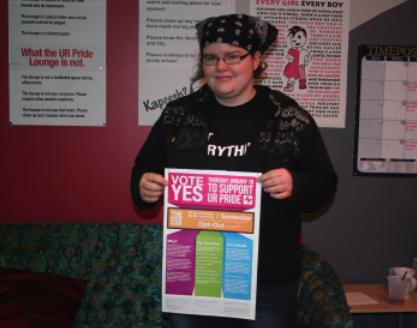Students at the University of Regina have agreed to fund the campus UR Pride Centre for Sexuality and Gender Diversity.
After a vote Jan 19, full-time students will now pay $1 per semester to the centre, and part-time students will contribute 50 cents each. Of the 475 ballots counted, 86 percent voted in favour of the fund. Those students who don’t want to pay will be able to opt out.
The new levy will amount to about $20,000 for the UR Pride Centre. In previous years, the centre has had to apply to the U of R Students’ Union (URSU) for funding.
“I’m super excited,” says UR Pride Centre executive director Lisa Smith. “This will mean that we have stable funding, and what stable funding means is that we no longer have to worry at the end of our fiscal year whether or not we’re going to be able to continue [providing services].”
This is the second time in three years that a referendum has been held on behalf of the UR Pride Centre. Back in 2008, the centre asked full-time students for $3.50 per semester and $1.75 from part-time students; 58 percent voted “no.”
The UR Pride Centre is the only funded queer service agency in southern Saskatchewan. It offers workshops, a youth group, peer support, referrals, social events, safe-sex supplies, a resource library and a drop-in lounge for students.
About $22,000 of UR Pride’s budget comes from URSU. Another $20,000 comes from the U of R, and the rest is dependent on grants and fundraising.
The new student levy will replace the money the centre typically receives each year from URSU.
Smith says the result of the referendum is a relief, because URSU’s board members change every year.
“If, for some reason, one of [the new board members] were against what we’re doing, or [weren’t] as supportive, they could choose simply not to fund us,” she says.
UR Pride began as a social club in 1996 and became a full-fledged centre in 2005.
Back in the late ’80s, Lyndon Surjik, a former president and vice-president of URSU, tried to start a gay and lesbian club on campus. Nearly a dozen people showed up to the first meeting, but with no resources, the group didn’t survive.
“There was no concept at that time [dictating] that the campus community needed to support gay and lesbian students,” says Surjik, who is now the executive assistant of Qmunity, a queer resource centre in Vancouver.
“In fact, even at the time, we had to continue to defend the whole idea of a women’s centre, if you can imagine. That’s where the battleground was . . . So, any kind of support structure for gay and lesbian students was just not on the radar.”
Surjik says the results of the recent referendum — especially the fact that it passed with an overwhelming majority — are a sign that times have changed.
“I think that tells you it’s just a different world now from when I was [at the U of R],” he says. “Stable funding for a pride centre is a very important part of advancing rights and understanding and tolerance and acceptance for a community.”

 Why you can trust Xtra
Why you can trust Xtra


